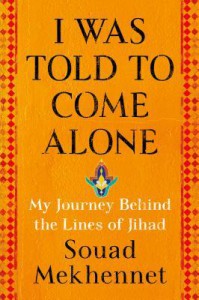I Was Told to Come Alone by Souad Mekhennet

This memoir of a Muslim journalist reporting on jihad was interesting, though I wasn’t blown away in the way most reviewers seem to have been. Souad Mekhennet grew up primarily in Germany, the daughter of guest workers from Morocco and Turkey. She encountered racism and xenophobia on her way to becoming a successful journalist, but speaking Arabic and her familiarity with Middle Eastern cultures went a long way to ensure her success.
Aside from some description of her childhood, this book is focused almost exclusively on her professional life, with chapters organized around a visit to a particular place or an act of terror on which she was reporting. Mekhennet interviews dangerous people – on occasion braving serious danger in order to reach them – is arrested by Egyptian security forces, and impresses a lot of jihadists, who are willing to vouch for her and sometimes even propose to her. She asks everybody tough questions though and challenges everyone’s views.
I liked this book and learned from it, and I’m impressed by Mekhennet’s gutsiness. We need reporters like her to dig deep enough to get the real story, and to be skeptical and push back on what they’re being told. That said, I didn’t love her book. As a work of nonfiction about the state of the Muslim world and its relationship to the U.S. and Europe, I found it a little disconnected, as it focuses tightly on Mekhennet’s specific assignments and experiences. It reminded me of how much I don’t know about the Muslim world without filling in many of those gaps. But learning about how jihadists and their family members and supporters view the world was certainly enlightening.
As a memoir, it’s rather impersonal. Even as a teenager Mekhennet portrays herself as a powerhouse whose only obstacle to overcome is xenophobia; nothing more mundane like shyness about approaching important people or soliciting internships, or issues with dating, seems to faze her. (As an adult she often mentions wanting to marry, and briefly discusses dating, where her primarily stumbling block seems to be concern for her safety, such that she wants to chat anonymously for months before meeting a man.) Though I do give her credit for discussing the alienation she, like many other Muslims teens in Europe, felt after seeing hate crimes on the news and experiencing harassment and discrimination. Fortunately she had a strong support network, positive role models, and opportunities to succeed, but less lucky kids who feel despised are vulnerable to recruitment by terrorist organizations that understand their mindset very well.
Overall, I’m glad I read this, but didn’t have strong feelings about it. The book is a somewhat dense read that takes some time to get through, but it is informative, and the author has definitely had some interesting experiences.





